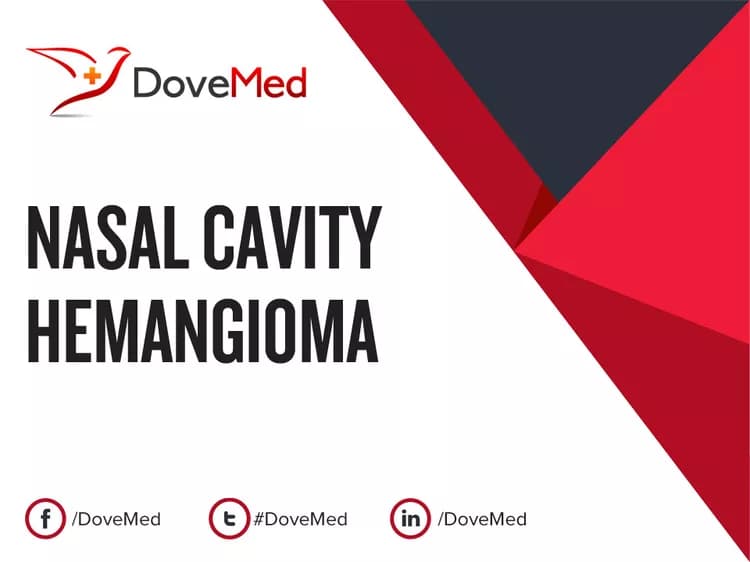What are the other Names for this Condition? (Also known as/Synonyms)
- Hemangioma of Nasal Cavity
- Intranasal Lobular Capillary Hemangioma
- Nasal Cavity Haemangioma
What is Nasal Cavity Hemangioma? (Definition/Background Information)
- Hemangiomas are benign accumulations of blood vessels, which can occur in several tissues such as the brain, kidney, liver, lung, skin (cherry), and nasal cavity
- Nasal Cavity Hemangiomas are extremely rare, benign vascular tumors; there are only a few cases reported in medical literature
- Currently, there are no known risk factors for the development of Nasal Cavity Hemangiomas. The condition is considered idiopathic, meaning there are no well-established causes for the development of these hemangiomas
- The signs and symptoms of Nasal Cavity Hemangiomas may include recurrent epistaxis (bleeding from the nose), nasal obstruction and discharge, as the mass grows quickly over time
- The hemangiomas may bleed, causing obstruction of the airways. This can lead to severe complications. Although most tumors are asymptomatic, some tumors may require to be treated.
- A Nasal Cavity Hemangioma may be diagnosed by evaluating the clinical history and a thorough physical exam, followed by imaging studies, such as CT and MRI scans of the head and neck region
- The treatment techniques for Nasal Cavity Hemangiomas may include cryotherapy, use of sclerosing solutions, and removal of the tumor through endoscopic surgery. The prognosis of Nasal Cavity Hemangiomas is good with appropriate treatment
Who gets Nasal Cavity Hemangioma? (Age and Sex Distribution)
- Nasal Cavity Hemangiomas are very uncommon vascular tumors. Currently, only a few cases have been reported worldwide
- The tumor is known to occur at any age. It may occur in individuals of any race, ethnicity, or gender
What are the Risk Factors for Nasal Cavity Hemangioma? (Predisposing Factors)
- Currently, there are no known risk factors for the development of Nasal Cavity Hemangiomas
It is important to note that having a risk factor does not mean that one will get the condition. A risk factor increases one’s chances of getting a condition compared to an individual without the risk factors. Some risk factors are more important than others.
Also, not having a risk factor does not mean that an individual will not get the condition. It is always important to discuss the effect of risk factors with your healthcare provider.
What are the Causes of Nasal Cavity Hemangioma? (Etiology)
- Currently, there are no identified causes for the development of Nasal Cavity Hemangiomas
- Researchers believe that it could be a malformation during fetal development
What are the Signs and Symptoms of Nasal Cavity Hemangioma?
Although most adult Nasal Cavity Hemangiomas are asymptomatic, the following symptoms may occur in some individuals:
- Recurrent epistaxis (nosebleeds)
- Nasal obstruction
- Nasal discharge
- Facial pain
- Alteration of smell
- Headaches
How is Nasal Cavity Hemangioma Diagnosed?
A diagnosis of Nasal Cavity Hemangioma may include:
- Evaluating the clinical history and a thorough physical exam of the individual
- CT and MRI scan of the head
- Tissue biopsy: A tissue biopsy is performed and sent to a laboratory for a pathological examination. The pathologist examines the biopsy under a microscope. After putting together clinical findings, special studies on tissues (if needed) and with microscope findings, the pathologist arrives at a definitive diagnosis
Many clinical conditions may have similar signs and symptoms. Your healthcare provider may perform additional tests to rule out other clinical conditions to arrive at a definitive diagnosis.
What are the possible Complications of Nasal Cavity Hemangioma?
Complications associated with Nasal Cavity Hemangiomas may include:
- Severe bleeding of the hemangioma
- Obstruction of the airways
- Psychological distress, which is commonly associated with many forms of hemangiomas
- Recurrences on incomplete surgical removal (in some cases)
How is Nasal Cavity Hemangioma Treated?
Although most cases are asymptomatic and may not require to be treated, some individuals with Nasal Hemangiomas may require treatment.
The treatment options for Nasal Cavity Hemangiomas may include:
- Cryotherapy
- Corticosteroid treatment
- Sclerosing solutions
- YAG laser
- Endoscopic surgery
How can Nasal Cavity Hemangioma be Prevented?
Currently, there is no effective steps to prevent the formation of Nasal Cavity Hemangiomas. These tumors are known to occur spontaneously.
What is the Prognosis of Nasal Cavity Hemangioma? (Outcomes/Resolutions)
- The prognosis of Nasal Cavity Hemangioma is typically good with adequate treatment; a full recovery is often ensured and no long-term complications are noted
- Endoscopic surgery is the most reliable treatment tool to completely remove the tumor and prevent any recurrences from taking place
Additional and Relevant Useful Information for Nasal Cavity Hemangioma:
- Cavernous hemangiomas are benign growths composed of small blood vessels that occur on skin tissues, anywhere in the body, usually in children. These benign tumors can sometimes rupture and bleed if injured
- A benign capillary hemangioma is one of the most common type of hemangioma that can be either present from birth (congenital origin) or develop sometime later
The following links may help you find useful additional information on cavernous hemangioma and benign capillary hemangioma:
http://www.dovemed.com/diseases-conditions/cavernous-hemangioma/
http://www.dovemed.com/diseases-conditions/benign-capillary-hemangioma/
Related Articles
Test Your Knowledge
Asked by users
Related Centers
Related Specialties
Related Physicians
Related Procedures
Related Resources
Join DoveHubs
and connect with fellow professionals


0 Comments
Please log in to post a comment.